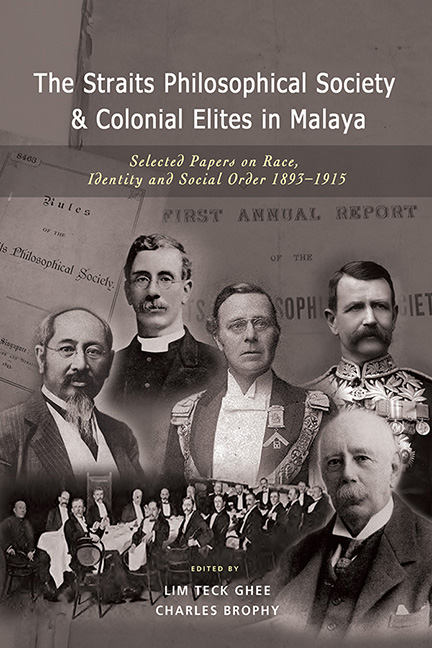 The Straits Philosophical Society and Colonial Elites in Malaya
The Straits Philosophical Society and Colonial Elites in Malaya Published online by Cambridge University Press: 09 January 2024
Editors’ Note
Discussions of religion in the Society were driven by the missionaries and religious ministers who held membership. One such figure was G.M. Reith, a Presbyterian minister, who left Singapore in 1896. Reith—a representative of a more liberal tendency in the church—would reflect in his 1895 essay on two contemporary discussions in missionary circles in the 1890s. The first was the relationship between Christianity and Islam, and the second was the role of proselytization in the colony. Reith’s liberalism was evident in the way in which his understanding of religion was couched in Darwinian terminology and defined by man’s struggle against his environment. His identification of religious belief with the category of race allowed him to trace the monotheisms of the Middle East to a shared racial heritage, differentiated only by the “aber-glaube” (extra-beliefs) which had developed at a later stage. This argument allowed for Reith to disassociate himself from the hostility towards Islam amongst members of the missionary community. By moving beyond the “aber-glaube” he proposed that a dialogue could take place between Christianity and Islam that did not have as its end the ideas of religious supremacy or salvation, but a shared liberal idea of progress.
A similar liberal tendency also informed Reith’s views on proselytization of the Muslims of the colony. Opposing the missionary focus upon conversion, Reith argued that the focus of missionaries should be on building up a critical intellectual spirit amongst the Malays. This could mirror the critical re-adjustment which had occurred in Christianity. Increasing the spirit of inquiry could help Muslims uncover the “vital principle of faith which is common to the three great religions of the world”. Reith’s piece nevertheless generated heated debate in the pages of The Free Press, with supporters in The Free Press defending his position. Dissatisfaction from his congregation and missionaries eventually saw Reith being dismissed from his post.
Let me first define the scope and limits of this essay, the title of which suggests a subject of apparently unlimited extent.
To save this book to your Kindle, first ensure [email protected] is added to your Approved Personal Document E-mail List under your Personal Document Settings on the Manage Your Content and Devices page of your Amazon account. Then enter the ‘name’ part of your Kindle email address below. Find out more about saving to your Kindle.
Note you can select to save to either the @free.kindle.com or @kindle.com variations. ‘@free.kindle.com’ emails are free but can only be saved to your device when it is connected to wi-fi. ‘@kindle.com’ emails can be delivered even when you are not connected to wi-fi, but note that service fees apply.
Find out more about the Kindle Personal Document Service.
To save content items to your account, please confirm that you agree to abide by our usage policies. If this is the first time you use this feature, you will be asked to authorise Cambridge Core to connect with your account. Find out more about saving content to Dropbox.
To save content items to your account, please confirm that you agree to abide by our usage policies. If this is the first time you use this feature, you will be asked to authorise Cambridge Core to connect with your account. Find out more about saving content to Google Drive.